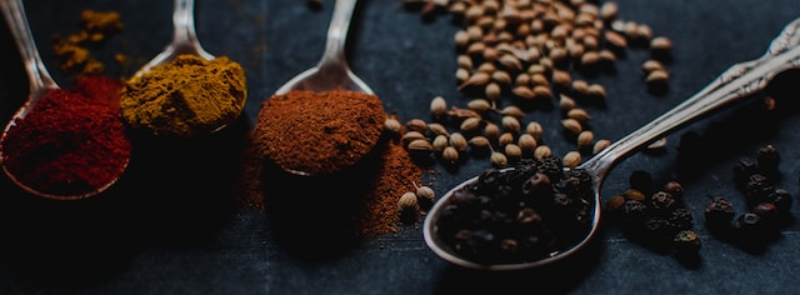
When It Occurs
Every June 10th
Timeline
Days Passed (988)
# Hashtags
#NationalHerbsAndSpicesDay #HerbsAndSpices
Get ready to honor National Herbs and Spices Day on June 10th by indulging in a delectable dish that highlights the incredible flavors these ingredients offer! For centuries, herbs and spices have adorned dishes, adding flavor, medicinal benefits, and vibrant hues. Today, these essential elements grace nearly every cuisine imaginable, from Italian and Asian to Mexican and beyond. Packed with antioxidants, they contribute to our well-being. Let's commemorate this day by crafting something extraordinary with these flavorful additions!
Significance of National Herbs and Spices Day
The celebration highlights the key role herbs and spices play in culinary traditions worldwide. Without herbs and spices, many dishes would be bland and lack complexity. This day encourages people to explore new flavors, experiment with different combinations, and embrace the diverse array of herbs and spices available.
In addition to culinary use, many herbs and spices possess health-promoting properties. They are rich in antioxidants, vitamins, and minerals, and can aid in digestion, reduce inflammation, and boost the immune system.
Popular Herbs and Spices
Some of the most commonly used herbs and spices include:
-
Basil: Known for its sweet, slightly peppery flavor, basil is used in Italian, Mediterranean, and Southeast Asian cuisines. It's often added to pasta sauces, salads, and pesto.
-
Rosemary: This fragrant herb has a pine-like aroma and is used in roasted meats, potatoes, and bread.
-
Oregano: A staple in Italian and Greek cooking, oregano has a robust, earthy flavor that's perfect for pizza, tomato sauces, and grilled meats.
-
Thyme: Thyme has a subtle, earthy flavor and is commonly used in soups, stews, and roasted dishes.
-
Cilantro: Popular in Mexican, Indian, and Asian cuisines, cilantro has a bright, citrusy flavor that enhances salsas, curries, and salads.
-
Parsley: Known for its fresh, clean flavor, parsley is used as both a garnish and a key ingredient in sauces, salads, and stews.
-
Cinnamon: A warm, sweet spice that is commonly used in desserts, baked goods, and beverages like chai tea and hot chocolate.
-
Turmeric: Known for its vibrant color and anti-inflammatory properties, turmeric is used in Indian curries, soups, and teas.
-
Cumin: This earthy, nutty spice is a key ingredient in Middle Eastern, Indian, and Mexican cuisines, adding depth to dishes like chili, curry, and hummus.
-
Ginger: With its sharp, spicy flavor, ginger is commonly used in Asian dishes, baked goods, and teas. It's also known for its digestive benefits.
Ways to Celebrate National Herbs and Spices Day
There are many ways to participate in National Herbs and Spices Day, whether you're an experienced cook or just starting to experiment with different flavors.
-
Try New Herbs and Spices: Visit your local farmers market, grocery store, or spice shop and pick up herbs or spices you've never tried before. Incorporate them into your meals to discover new flavor combinations.
-
Grow Your Own Herb Garden: Planting an herb garden is a great way to have fresh herbs at your fingertips year-round. Herbs like basil, thyme, rosemary, and cilantro are easy to grow in small spaces, including window sills and balconies.
-
Cook a New Recipe: Try cooking a dish from a cuisine you're unfamiliar with, using the herbs and spices that define that culture's cooking style. For example, try an Indian curry, a Moroccan tagine, or a Thai stir-fry.
-
Learn About the Health Benefits: Research the health benefits of your favorite herbs and spices. Many are packed with antioxidants, vitamins, and anti-inflammatory properties. Incorporate them into your diet for added health benefits.
-
Create Your Own Spice Blend: Get creative in the kitchen by mixing different spices together to make your own signature blend. Popular blends include garam masala, herbes de Provence, and Cajun seasoning.
-
Infuse Oils or Vinegars: Herbs and spices can be used to infuse oils and vinegars, creating flavorful bases for dressings, marinades, and sauces. Try infusing olive oil with rosemary or making a vinegar infused with garlic and chili peppers.
Health Benefits of Herbs and Spices
Many herbs and spices offer significant health benefits, and incorporating them into your diet can promote overall well-being. Here are a few examples:
-
Turmeric: Contains curcumin, which has anti-inflammatory and antioxidant properties. It is believed to help with conditions like arthritis and may lower the risk of heart disease.
-
Cinnamon: May lower blood sugar levels and has been shown to have a powerful anti-diabetic effect. It’s also high in antioxidants.
-
Garlic: Has been used for its medicinal properties for thousands of years. It's known to improve immune function and lower blood pressure.
-
Ginger: Commonly used to reduce nausea and fight inflammation, ginger is also beneficial for digestive health and can help ease symptoms of cold and flu.
-
Peppermint: Known for its soothing effects on the digestive system, peppermint is also used to relieve headaches and improve respiratory function.
Fun Facts About Herbs and Spices
-
Oldest Spice: Archaeological evidence suggests that black pepper was the world's oldest known spice, used as far back as 2000 B.C. in Indian cuisine.
-
Value of Spices: In the Middle Ages, spices like black pepper were so valuable they were used as currency and traded for goods.
-
Herb Varieties: There are more than 30 varieties of basil alone, including Thai basil, lemon basil, and holy basil.
-
Cultural Importance: In many cultures, herbs and spices are not only used for cooking but also for ceremonial and medicinal purposes.
Conclusion
National Herbs and Spices Day offers a flavorful way to celebrate the richness and diversity of herbs and spices in our daily lives. Whether you're an avid gardener, a passionate cook, or simply someone who enjoys learning about food, this day encourages exploration and appreciation of the many herbs and spices that enhance our meals and improve our health.


